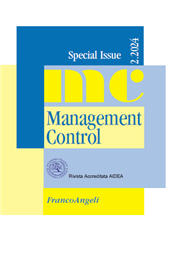Searching for the drivers of organizational resilience in times of crisis : an example from the Covid-19 pandemic
125-148 p.
The theme of organizational resilience has been acquiring relevance for some time to date due to the health crises and geopolitical tensions that have marked the last years. Understanding which drivers helped ensure business continuity during such crises can subsequently help managers prepare for future challenges or shocks. Answering the call for an aggregate analysis of the drivers of organizational resilience, this study identifies three main categories: the first one focuses on the hu-man characteristics of the business community; the second focuses on the role played by management control systems, and the third one points to the external support of consultants and stakeholders. This framework is applied to a case study of a not for profit organization (FASI – Fondo Assistenza Sanitaria Integrativa) that operates in the healthcare assurance sector and was strongly impacted by the Covid-19 pandemic. The results of this study reaffirm the multilevel essence of organizational resilience.
In more detail, the policies adopted by the company to face different challenges led to the achievement of three different types of resilience: reactive behavior bouncing-back to the previous equilibrium (type 1), adaptive behavior bouncing-forward to a higher level of equilibrium (type 2), and proactive behavior preparing for a possible future shock (type 3). [Publisher's Text].
Ist Teil von
Management Control : 2, 2024 special issue-
Artikel aus derselben Ausgabe (einzeln erhältlich)
-
Informationen
DOI: 10.3280/MACO2024-002-S1007
ISSN: 2239-4397
KEYWORDS
- Organizational resilience, Management control, Resilience drivers, Consultants, Crisis, Covid-19


